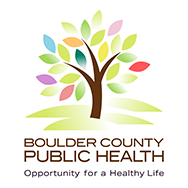Public health agencies across Colorado created the Public Health Radon Aware Colorado initiative to reduce exposure to radioactive radon gas and the associated risk of lung cancer.
In Colorado, 50% of homes have unhealthy radon levels, equivalent to every person in residence having 200 chest X-rays every year. This compares with only 6% of homes having unhealthy radon levels nationwide.
Radon is the leading cause of lung cancer deaths among nonsmokers in the U.S. and claims the lives of about 21,000 Americans each year. Radon-induced lung cancer is the eighth leading cause of cancer death in the U.S., and as many as 500 Coloradoans die from radon-induced lung cancer every year.
Action Steps to Protect from Radon
It takes actions by all of us to reduce radon risk and save lives. Below are actions real estate and building industry professionals, homebuyers, rental property owners, policy-makers, and local public health agencies can take to protect children, families, and their communities:
- Real Estate Professionals: Become a Radon Aware Real Estate Professional. It’s quick, easy, and can help save lives.
- Builders & Building Professionals: Utilize the latest Colorado technical guidance to construct radon-resistant new homes and learn how to implement radon-resistant new construction techniques (RRNC) in new single- and multi-family homes.
Additional Resources for Builders & Building Professionals - Building Departments: Learn about radon-resistant new construction and radon mitigation in this technical guidance for Colorado and inspection procedures for ensuring radon systems are installed correctly in new homes.
- Homebuyers: Test for radon. Fixing the problem is easy and inexpensive.
- Rental Property Owners: Test your rental for radon. Inform renters, in writing, before a lease is signed that the rental space has been tested for radon and disclose the results.
- Policy-Makers: Consider making Radon Resistant New Construction a requirement in your jurisdiction. Many communities have already taken steps toward adopting these codes. See recommended program and policy options to protect your community in the Radon Reduction Roadmap.
- Local Public Health Agencies: Request free radon communication materials for use in your community outreach and education programs.
- Radon Professionals: Become a Gold Star Mitigator or Testing Professional. Promote your experience and credibility with customers looking for reliable contractors.
About Public Health Radon Reduction Roadmap (PHR3)
The Public Health Radon Reduction Roadmap (PHR3) project aims to reduce radon exposure and its associated risk of lung cancer by encouraging and supporting Colorado communities in becoming Radon Aware.
The project also promotes radon awareness among the Colorado real estate community, policymakers, and building industry professionals through education and sharing best practices to reduce indoor radon exposure.


